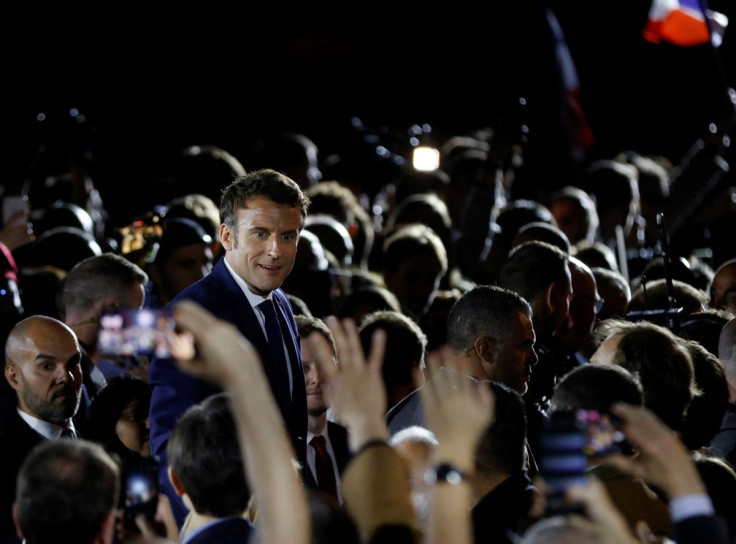Macron Says Le Pen Showing Authoritarian Streak After Journalist Ban

French President Emmanuel Macron launched a scathing attack on far-right rival Marine Le Pen on Wednesday, saying her true "authoritarian" intentions were showing after she banned a team of reporters and did not rule out a return to the death penalty.
Macron, a pro-European centrist, became president in 2017 after easily beating Le Pen when voters rallied behind him to keep the far-right out of power. This time, he faces a tougher challenge.
Slightly behind in opinion polls, Le Pen has successfully softened her image and tapped into anger over the cost of living and a perception Macron is disconnected from everyday hardships. Some polls show her victory in the April 24 runoff is within the margin of error.
"Despite all the efforts, the true face of the far-right is coming back. It is a face that doesn't respect freedoms, the constitutional framework, press independence and fundamental freedoms, rights," Macron told France 2 television.
Such comments are the start of an "authoritarian drift," said Macron, who has of late categorised Le Pen's manifesto as full of lies and false promises that conceal a far-right agenda ultimately leading to France leaving the European Union.
Le Pen said the show whose journalists were refused accreditation was entertainment rather than journalism and that she reserved the right - now as a candidate, and later as president if elected - to choose who may attend her news conferences.
She retorted that Macron was showing his "weakness" and was in no position to give lessons on how to handle the press.
Macron has had a bumpy relationship with the media during his presidency and last week was criticised for refusing to take part in several prime time shows ahead of the first round.
"He'd be better off going into the substance of my project. It is known, transparent. We can discuss it and argue over our disagreements," Le Pen said at a campaign stop outside of Paris.
FREXIT?
Later on Wednesday, Le Pen - a eurosceptic who had long professed admiration for Russian President Vladimir Putin - gave a news conference on her foreign policy plans, which she said was aimed at clearing up what she called misunderstandings.
"Nobody is against Europe," said Le Pen, who has ditched plans to leave the EU or the euro, which cost her votes in past elections.
She said she aimed to reform the EU from the inside, in what critics say would be a "Frexit" departure from the bloc in all but name.
LEFTWING VOTES
Ahead of the second round, both candidates are seeking to win over left-wing voters, especially from hard-left third-place candidate Jean-Luc Melenchon.
Melenchon's party launched a consultation on Wednesday to ask his supporters if they planned to vote for Macron, put in a blank ballot or not vote.
"Neither Emmanuel Macron nor Marine Le Pen are up to the task," Melenchon wrote. "However, the two are not equivalent. Marine Le Pen adds a dangerous ferment of ethnic and religious exclusion to the project of social damage that she shares with Emmanuel Macron."
Even after the consultation closes on Saturday, Melenchon signalled he would give voters no instruction on what they should do on the 24th - whereas other parties have urged voters to back Macron in order to block the far-right.
Macron, who already had said he would increase pensions this summer if re-elected, told TF1 television that it would be a 4% increase. On Monday, he opened the door to potentially pushing the retirement age from 62 at the moment to 64, rather than to 65, his initial proposal.
Macron's efforts to woo leftwing voters could be hurt after former conservative President Nicolas Sarkozy, a reviled figure on the left, endorsed him and forced Macron to deny there was any wider political agreement.
Macron will need a new majority after legislative elections in June and political sources have said Sarkozy's endorsement could pave the way for an alliance between the centre-right Les Republicains party and Macron's LaRem.
© Copyright Thomson Reuters 2024. All rights reserved.





















